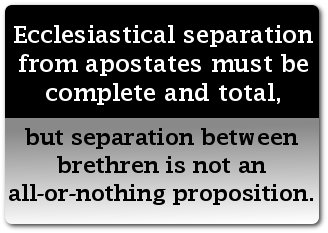GARBC 2006
 The General Association of Regular Baptist Churches has been in a controversy about Cedarville University ever since the school accepted endorsement by the State Convention of Baptists in Ohio. This endorsement provided Cedarville with a formal link to Southern Baptist circles that paralleled its relationship of approval and partnering in Regular Baptist circles. Though both Regular Baptists and Southern Baptists are formally committed to the fundamentals of the faith, they are different in important ways. One difference is their attitude toward church leaders who deny the fundamentals. The GARBC has not been willing to tolerate churches that deny fundamentals of the faith. It has not even been willing to tolerate churches that tolerate others who deny fundamentals. It has separated from apostates and from those who were willing to fellowship with them.
The General Association of Regular Baptist Churches has been in a controversy about Cedarville University ever since the school accepted endorsement by the State Convention of Baptists in Ohio. This endorsement provided Cedarville with a formal link to Southern Baptist circles that paralleled its relationship of approval and partnering in Regular Baptist circles. Though both Regular Baptists and Southern Baptists are formally committed to the fundamentals of the faith, they are different in important ways. One difference is their attitude toward church leaders who deny the fundamentals. The GARBC has not been willing to tolerate churches that deny fundamentals of the faith. It has not even been willing to tolerate churches that tolerate others who deny fundamentals. It has separated from apostates and from those who were willing to fellowship with them. The Southern Baptist Convention has a more ambivalent attitude. Though Southern Baptist conservatives have controlled the presidency and thereby shifted the operational control of Convention agencies into the hands of conservatives, they have made no recognizable attempt to expunge apostates from the denomination. Liberal professors and ecclesiastics simply regrouped under the shelter of state conventions or ad‐hoc organizations while remaining within the Southern Baptist fold.
The Southern Baptist Convention has a more ambivalent attitude. Though Southern Baptist conservatives have controlled the presidency and thereby shifted the operational control of Convention agencies into the hands of conservatives, they have made no recognizable attempt to expunge apostates from the denomination. Liberal professors and ecclesiastics simply regrouped under the shelter of state conventions or ad‐hoc organizations while remaining within the Southern Baptist fold.
I do not intend this observation as an attack upon Southern Baptist conservatives. What they have accomplished is genuinely amazing. I admire their commitment to theology and their willingness to pursue a decades‐long course of action in order to restore orthodoxy to dominance within their denomination. Nevertheless, the GARBC and the SBC have seriously different perspectives about whether to tolerate churches and church leaders that deny fundamental doctrines.
This difference is exacerbated by the long‐standing opposition of the GARBC to conventionlike organization. From the very beginning, the GARBC refused to form its own mission society or to operate its own institutions of higher learning. It has always objected to the notion of a cooperative program, insisting that the biblical way of financing the Lord’s work was for individual Christians and churches to direct their own monies toward the ministries that they found most compelling. The most that the GARBC was ever willing to do was to recommend certain institutions to the churches as worthy of support—a process that was called “approval.” The Southern Baptist Convention, however, has placed major emphasis upon the “Cooperative Program,” and has occasionally disfellowshipped churches and pastors that would not support it. While the difference between the GARBC and the Southern Baptist conservatives must not be overstated, it is nevertheless real. In their attitudes toward convention machinery and toward people who deny fundamental doctrines, the SBC conservatives and the GARBC are basically incompatible. Furthermore, if pressed to change its position, each side would quickly insist that its view was too important to abandon.
By seeking to identify with both movements, Cedarville University placed the leadership of the GARBC in a difficult situation. Many Regular Baptists thought that by accepting Southern Baptist endorsement, Cedarville was tacitly affirming a policy that the GARBC had historically opposed. Furthermore, Cedarville issued public statements to the effect that it had coveted and pursued the relationship with Southern Baptists over a period of decades. This came as a surprise to many Regular Baptists, who had been given reason to think that Cedarville shared the perspectives of the GARBC on issues like conventionism and separation.
The GARBC leadership tried to solve the problem by eliminating all formal structures for approving, endorsing, or partnering with independent agencies. What they discovered, however, is that some form of approval always returns. Someone had to decide which institutions would be permitted to advertise in the Baptist Bulletin, to sponsor Talents for Christ, and to set up displays at the annual conference.
Then the fact surfaced that Cedarville University was unwilling to subscribe to the GARBC statement of purpose. Consequently, the Council of Eighteen determined that sufficient commonality did not exist between the GARBC and Cedarville University to allow the university to advertise itself through official GARBC channels. That decision was challenged by friends of Cedarville University and brought to a vote at the annual meeting this year. By a wide margin, the messengers adopted a statement upholding the formal position of the GARBC on separation. By a much narrower margin, they upheld the council’s decision not to allow Cedarville to advertise in the Baptist Bulletin or at the conference.
What does all of this mean? In the first place, it does not mean that Cedarville has become a neo‐evangelical institution. Neo‐evangelicals were people whose attitude toward apostates was to tolerate them in their organizations, to cooperate with them where necessary, and to infiltrate organizations that were controlled by them. Cedarville University has never displayed these attitudes. Its theology is thoroughly orthodox. It would not for a moment tolerate a theological liberal or any other apostate within the institution. If nearby Dayton were to host an ecumenical evangelistic campaign, Cedarville University would surely abstain. No, Cedarville is not neoevangelical and cannot rightly be treated as if it were.
Cedarville University differs with the GARBC over the question of how to relate to those Christians who are willing to tolerate liberals or other apostates at some level. For the GARBC, the answer is “no organizational alignments.” For Cedarville University, the answer has become “pursue and accept a formal, organizational endorsement.” Not surprisingly, the GARBC is uncomfortable with the idea of recommending Cedarville University. Their difference is not incidental. It touches upon a fairly important point, namely, the importance of separation from apostasy. This point does have biblical implications.
Some critics have asked whether the GARBC has a Scripture that requires this action. While a case could be made that it does, such a Scripture really is not necessary to justify the decision of the GARBC. The association and the university have understood New Testament requirements in incompatible ways. If each is to carry out its vision with integrity, then some degree of separation seems necessary.
Does this rebuff mean that the GARBC is separating from Cedarville University? If a refusal to endorse can be construed as separation, then yes, it does. All separation, however, is not created equal. Ecclesiastical separation from apostates must be complete and total, but separation between brethren is not an all‐or‐nothing proposition. The New Testament reveals various levels of separation that are inversely proportional to various levels of fellowship. Some erring brothers must be treated as gentiles and publicans (i.e., as adversaries). Others, however, are to be avoided, yet treated as brothers and not as enemies.
In other words, even though a formal check has been placed upon the institutional relationship between Cedarville University and the GARBC, this check does not necessarily constitute an air‐tight bulkhead. It is not unthinkable that the National Representative of the GARBC could preach in chapel at Cedarville University. It is not impossible that the president of Cedarville University might be invited to preach at the GARBC. It is not unimaginable that Faith Baptist Bible College (a very separatist institution) could use a professor from Cedarville to teach a course. None of these things is very likely under the present spirit of controversy, but these are different levels of involvement that do not necessarily carry the same connotations as a formal advertisement.
At the end of the day, the individual churches of the GARBC will make their own decisions about Cedarville University, and it is right that they should. If a church chooses to support or to advertise Cedarville, that is no business of Schaumburg. Cedarville will probably enjoy as much support from Regular Baptist churches in the future as it has enjoyed in the past. So what has changed?
What has changed is that the GARBC has formally and publicly shown how seriously it takes certain aspects of its ethos. It has visibly upheld its position, not only as true, but as important. This process of definition will undoubtedly repel some, but with equal certainty it ought to attract others.
A Bruised Reed Shall He Not Break
Christina Rossetti (1830-1894)
I will accept thy will to do and be,
Thy hatred and intolerance of sin,
Thy will at least to love, that burns within
And thirsteth after Me:
So will I render fruitful, blessing still,
The germs and small beginnings in thy heart,
Because thy will cleaves to the better part.—
Alas, I cannot will.
Dost not thou will, poor soul? Yet I receive
The inner unseen longings of the soul,
I guide them turning towards Me; I control
And charm hearts till they grieve:
If thou desire, it yet shall come to pass,
Though thou but wish indeed to choose My love;
For I have power in earth and heaven above.—
I cannot wish, alas!
What, neither choose nor wish to choose? and yet
I still must strive to win thee and constrain:
For thee I hung upon the cross in pain,
How then can I forget?
If thou as yet dost neither love, nor hate,
Nor choose, nor wish,—resign thyself, be still
Till I infuse love, hatred, longing, will.—
I do not deprecate.

–––––-
This essay is by Kevin T. Bauder, president of Central Baptist Theological Seminary. Not every one of Central’s professors, students, or alumni necessarily agrees with every opinion that it expresses. In The Nick of Time is also archived here.
- 59 views


Discussion